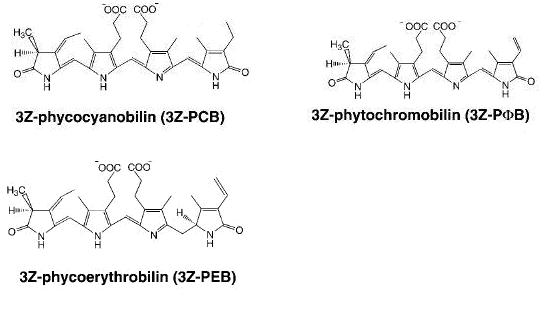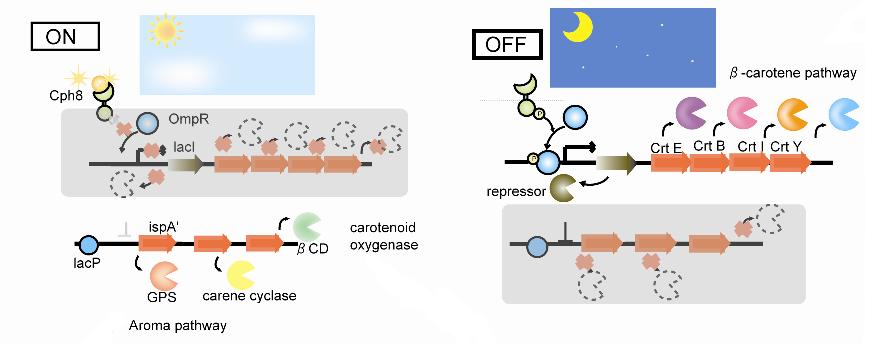Aromatic Bacteria : Chiba 2006
From 2006.igem.org
| Line 68: | Line 68: | ||
Aroma etc… | Aroma etc… | ||
| + | [http://www.ncbi.nlm.nih.gov/entrez/query.fcgi?cmd=Retrieve&db=pubmed&dopt=Abstract&list_uids=15236249 Yasuo Yoshikuni(2004)-Mono and diterpene production in Escherichia coli.] | ||
| + | [http://www.ncbi.nlm.nih.gov/entrez/query.fcgi?cmd=Retrieve&db=PubMed&list_uids=15577217&dopt=Abstract Gisho Honda(2004)cDNA isolation and functional expression of myrcene synthase from Perilla frutescens.] | ||
Revision as of 02:26, 13 September 2006
Contents |
concept
Wow!! By lighting bacteria, a refreshing scent stars filling the room. In the dark, the light sensing E.coli will turn orenge. With the red light on, the color of E.coli fades out, and aroma is produced instead.
members
schedule
9/7 8 9 10 11 12 13 14 15 16 17 18
Daisuke
Kensuke x x
Mayu x x x x
Shizuka
Keiichi
How it works
aroma
Firstly,we are going to make E.coli that smell good!
We are going to get gene that codes these products synthases.
[http://en.wikipedia.org/wiki/Carene Carene]
[http://en.wikipedia.org/wiki/Limonene Limonene]
[http://en.wikipedia.org/wiki/Pinene Pinene]
[http://en.wikipedia.org/wiki/Linalool Linalool]
[http://en.wikipedia.org/wiki/Geraniol Geraniol]
[http://en.wikipedia.org/wiki/Farnesene Farnesene]
light receptor
Secondary,We are going to make a light receptor that react different wavelength.
PCB reacts redlight (that is about 660nm). If we change PCB to PΦB and PEB , the absorption wavelength shifts 15nm respectively.
These are a structure of chromophore.

carotenoid
papers
Aroma etc…
[http://www.ncbi.nlm.nih.gov/entrez/query.fcgi?cmd=Retrieve&db=pubmed&dopt=Abstract&list_uids=15236249 Yasuo Yoshikuni(2004)-Mono and diterpene production in Escherichia coli.]
[http://www.ncbi.nlm.nih.gov/entrez/query.fcgi?cmd=Retrieve&db=PubMed&list_uids=15577217&dopt=Abstract Gisho Honda(2004)cDNA isolation and functional expression of myrcene synthase from Perilla frutescens.]
Light receptor etc…
[http://www.ncbi.nlm.nih.gov/entrez/query.fcgi?cmd=Retrieve&db=PubMed&list_uids=16458890&dopt=Abstract Takayuki Kohchi(2006)-Metabolic engineering to produce phytochromes with phytochromobilin, phycocyanobilin, or phycoerythrobilin chromophore in Escherichia coli.]
[http://www.pnas.org/cgi/content/full/101/50/17334?ck=nck J.Clark Lagarias(2004)-Harnessing phytochrome's glowing potential]
carotenoid etc…
news
- 9/12--We got a gene that codes geraniol synthase.
- 9/5--We solved a yesterday's problem. PUC-EBI was very dirty so it caused a lot of problem. After cleaning it, We got a clean band of PUC-EBI(linear).
- 9/4--We want to make PUC-EBIY. We got EBIY (it's orange color),but couldn't get PUC(vector).A band of PUC-EBI(linear)was very weak ,and we could see several bands. So we discussed what caused this problem.
- 8/29--We discussed about the light sensor bacteria.
- 8/12--Our first experiment using an aroma oil(Sweet Flavor-smells like orange). 10μl of oil was necessary for LB medium(solid and liquid) to smell good, or at least, better.
- 8/4 -- We created parts J29021(generator-3 enzymes that is used to produce a lycopene) and J29022(device-light receptor and LacI).
- 8/4 -- We added EuY(J29030) and carene cyclase(J29036) to the Registry. 4 changes were made to carene cyclase to remove restriction sites of ecoR1 and pst1.


